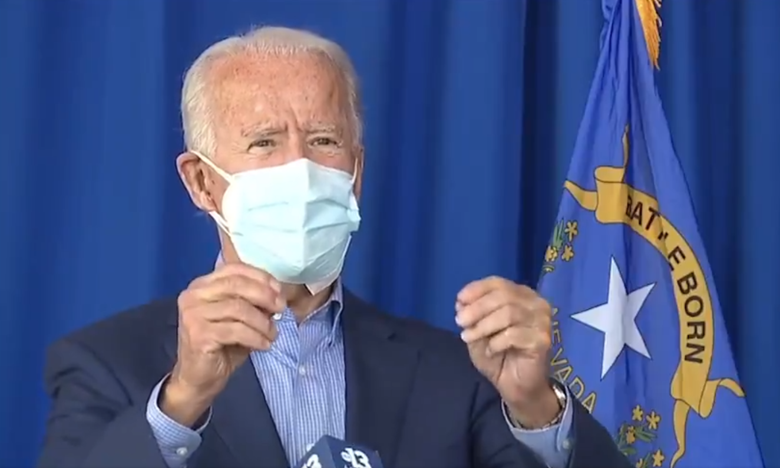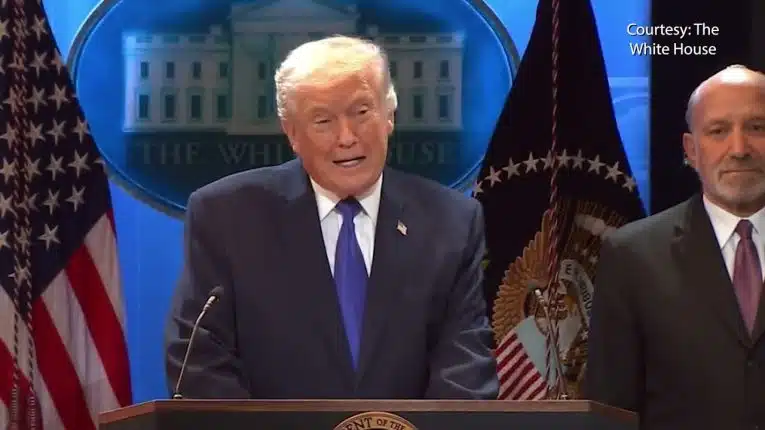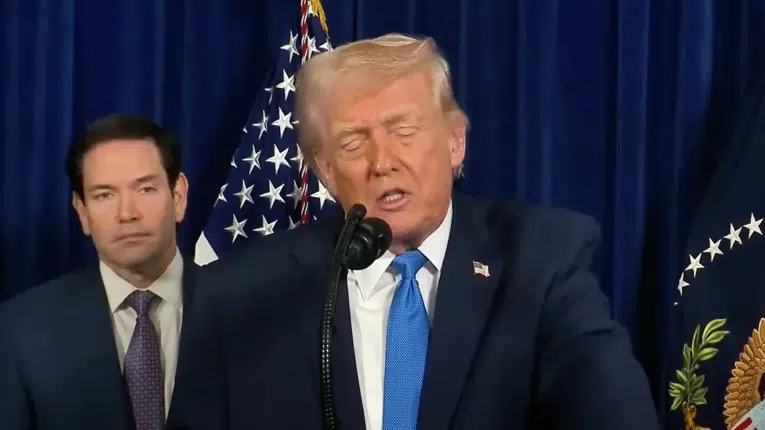The U.S. Senate has confirmed Justice Amy Coney Barrett to the U.S. Supreme Court by a vote of 52 to 48, creating a new 6 to 3 majority of Republican-appointed justices on the nation’s highest court—and the Democratic Party is in an absolute panic over the outcome.
Almost as soon as Ruth Bader Ginsburg passed away, Democrats were already threatening to abolish the filibuster in order to amend the Judiciary Act of 1869 and pack the Supreme Court — increasing the threshold way beyond the current nine justices set by law.
And the whole time, former Vice President Joe Biden has refused to tell the American people what he will do on packing the court if he wins the election.
On Oct. 10, Ross DiMattei on KTNV told Biden that “packing the courts” is “the number one thing I’ve been asked about from viewers in the past couple days” and asked, “Don’t the voters deserve to know?”
To which Biden declared, “No they don’t [deserve to know] — I’m not going to play his game. He’d love me to talk about, and I’ve already said something on pack[ing] the court. He’d love that to be the discussion instead of what he’s doing now.”
That followed Biden in Phoenix on Oct. 8 similarly refusing to answer the question on court-packing, stating, “You’ll know my position on court-packing the day after the election.”
And should Biden win, the American people will get to find out exactly what his administration might do. Usually, when Democrats win the White House, they similarly sweep the House and Senate, as every Democratic President since Franklin Roosevelt has done in his first term since 1932. And there won’t be much the American people can do about it.
The Constitution simply states, in Article II, Section 2, “The President… shall nominate, and by and with the advice and consent of the Senate, shall appoint … judges of the Supreme Court…”
Nothing, however, sets the number of justices in stone. To do that, Congress would have to pass and the States would have to ratify a constitutional amendment proposed by U.S. Sen. Ted Cruz (R-Texas), stating, “The Supreme Court of the United States shall be composed of nine justices.”
And nothing in the Constitution is said about the Senate filibuster except for Article I, Section 5, which states, “Each House may determine the Rules of its Proceedings.” That’s it. That makes the question of Senate rules a political question with which the Senate has full discretion.
Meaning, if the Senate decides to alter its own rules about how many votes it takes to end debate on legislation, it can do so with the same nuclear option Senate Democrats used in 2013, on lower judicial and executive appointments, and then Senate Republicans in 2017 on the Supreme Court itself. There’s nothing to stop it.
Now, with Barrett safely, and easily confirmed, the issue will be forced should Joe Biden win the election.
In the meantime, Justice Barrett’s confirmation is certainly a significant milestone for Senate Republicans including Senate Majority Leader Mitch McConnell (R-Ky.) and Senate Judiciary Committee Chairman Lindsey Graham (R-S.C.), who can now return to their states, making the case to their voters that they delivered a solid constitutionalist majority on the court.
Barrett served on the Seventh Circuit Court of Appeals, clerked for the late Antonin Scalia and shares his textualist philosophy of constitutional and legal interpretation on upholding the meaning of its words in federal courts.
In her review of Randy Barnett’s “Our Republican Constitution,” Barrett outlined a strong defense of originalist interpretation of the Constitution and of the law, urging “fidelity to the original public meaning”: “The measure of a court, then, is its fidelity to the original public meaning, which serves as a constraint upon judicial decision making. A faithful judge resists the temptation to conflate the meaning of the Constitution with the judge’s own political preference; judges who give into that temptation exceed the limits of their power by holding a statute unconstitutional when it is not.”
Barrett, however does not think the basis for originalism and textualism is the need for judicial restraint per se, but because the Constitution under Article VI is the supreme law of the land: “The Constitution’s original public meaning is important not because adhering to it limits judicial discretion, but because it is the law. And because it is the law, judges must be faithful to it.”
That is why President Donald Trump nominated Barrett, to ensure the Supreme Court’s commitment to safeguard the Constitution and the Bill of Rights. And it is exactly what the American people expect from a justice, upholding Marbury’s command for judges to “say what the law is”.
Barrett writes, “At the same time, fidelity will inevitably require a court to hold some statutes unconstitutional. When a statute conflicts with the Constitution, the fundamental law of the Constitution must take precedence, and the ordinary law of the statute must give way — because, properly understood, it is not law at all. A court does not overstep simply by holding a statute unconstitutional; it oversteps if it does so without constitutional warrant.”
Fundamentally, upholding the Supreme Law of the land is the rule of law, and there is no limited government without the Constitution. Without the Constitution, and good justices, the federal government could quickly devolve into arbitrary and tyrannical rule. To prevent that from happening, the Keep Nine Amendment would help a lot in the long-term — but in the short-term it appears the only way to keep the Supreme Court to nine justices would if the American people reelected President Donald Trump in 2020. Stay tuned.
Robert Romano is the Vice President of Public Policy at Americans for Limited Government.







